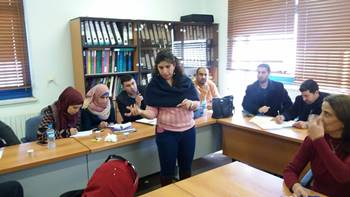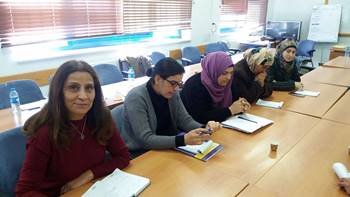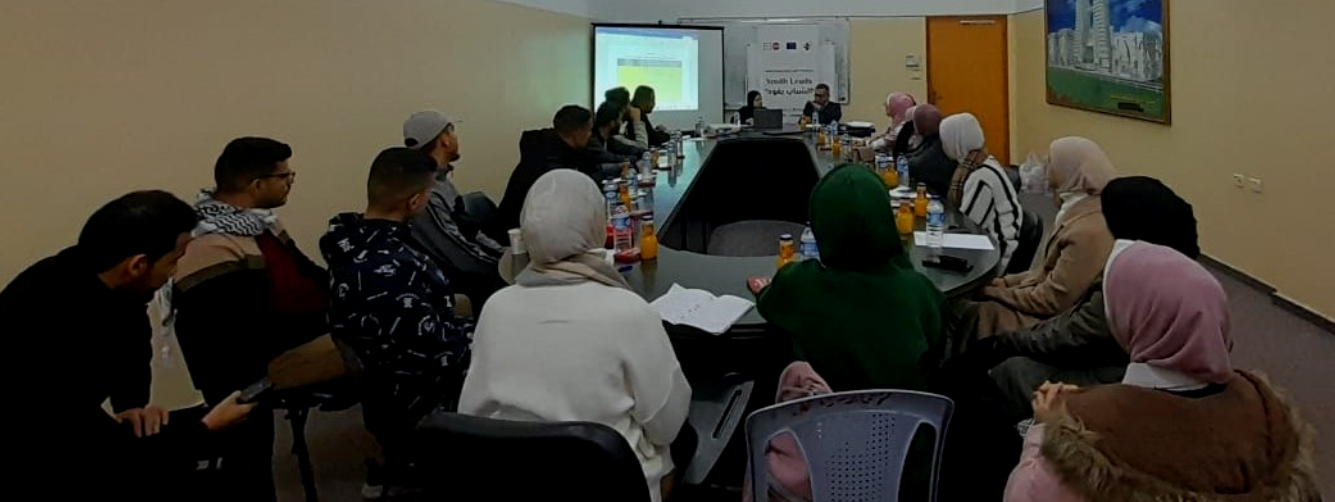
MIFTAH recently completed training on the promotion of the participatory approach in preparing the general and citizens’ budget in accordance with Transparency International standards for budgeting The training was conducted in cooperation with the Ministry of Education and Higher Education and was attended by 22 employees from the Ministry’s general budget team.
The training workshop is one activity of the “Finance for Development” project implemented by MIFTAH within the framework of the Good Governance in Palestine program in partnership with AMAN and ARIJ and funded by Oxfam-Novib.
Participant Feedback
The participants who attended the four-day training said the information and concepts introduced to them contributed to strengthening their skills and professional capabilities. Rawan Khayyat, Head of the Finance and Supplies Department at the National Training Institute said, “The training also greatly contributed to broadening our knowledge on all aspects of the state’s budget. It updated the information we had before.” In other words, Khayyat said, “This training was different than all the rest in that it went from the general to the specific.” This helped the participants interact easier with the trainer and the material, much of which focused on practical implementation.
Ahmad Siyara, Head of the Curriculum Department at the Ministry of Education and Higher Education said the training was positive from two aspects. “First, it gave us the opportunity as citizens to view the general budget, its resources, expenditures and gaps. From the professional aspect, the training gave us information on how to manage public funds and the obstacles to implementation such as the preparedness of the Ministry’s programs and the information needed when drawing up the semi-annual and annual reports on these programs.”
Siyara says the training’s theoretical material coupled with its practical and participatory applications allowed participants ample space to express their views and ideas, therefore boosting their capabilities and developing their skills and expertise. “This is what sets MIFTAH apart from others,” he maintains. “The trainer’s approach was a success in offering a theoretical framework alongside the practical with examples from real life. This made it easier for participants to understand the training overall.”
Furthermore, Head of the Planning Department at the Ministry of Education, Amal Hammad said this workshop was the first of its kind for her. “I attended training in France on program and bank budgets, but this training was much better.” She said the topics were more familiar to home. “I felt the training was more relevant to my job and addressed problems I find in my work.” Hammad also commended the trainer, saying his approach captivated the participants. “Because the training was dialogue and participatory-based, I felt more compelled to become involved in it at the theoretical and practical levels,” she said, adding that she learned new terms and information regarding Palestine’s budget and the planning process. Hammad says now she and her colleagues at the Ministry are much more up to date on terms and that the training also allowed them to unify budgetary concepts in all the Ministry’s departments, which in turn prompted them to be more participatory.
Samir Jabra, Head of the Studies Department in the General Planning Administration at the Ministry of Education maintained that the training workshop changed the way the employees viewed the PA and its financial reports. “The predominant image used to be one of corruption and nepotism, but organizations like MIFTAH and AMAN have changed our opinion,” he said. “Now we have access to PA institutions and can see the progress in government performance. This, in turn has motivated us to look at government agency reports and to try and understand them.”
The training program
General budget expert Mo’ayad Afaneh explained the nature of the training program. “The training program was designed specifically to offer information, skills and expertise to the Ministry of Education’s planning and budget team on the general budget,” he says. “This will give them the necessary skills for preparing the Ministry’s citizens’ budget.” Afaneh also said it promoted the participatory approach in preparing budgets so that this approach could be employed in the future while preparing the budgets at the Ministry. He mentioned the quantitative scope of the training program, saying it encompassed everything between early childhood education and higher education.”

Afaneh continues that the training program focused on strategies for adult education and methods of active training such as working groups, debates, simulation, interactive digital presentations, case studies and model analyses. He said the training program included several important pivotal points: the conceptual framework for the state’s general budget; the legal and legislative framework that regulates the general budget (the general budget law); the economic framework for the budget; the budget articles; reading and analysis of its reports; types of budgets; the methodological framework for preparing a participatory budget in Palestine; the methodological framework for preparing the citizens’ budget; practical training on preparing the citizens’ budget articles and analyzing the ministry of education’s programs for preparing the citizens’ budget.
Meanwhile, project coordinator Tamara Tamimi said a subsequent coaching follow up program would take place after the theoretical training to reaffirm the concepts, information, expertise and skills acquired and to work on preparing the citizens’ budget in order to cement it as an approach implemented annually at the Ministry.
The activity falls within the framework of institutionalizing the partnership between MIFTAH and the Ministry of Education and Higher Education in addition to offering its budget team the necessary skills to produce and release the citizens’ budget on a periodic and annual basis. It is also aimed at promoting transparency in the general budget and in public expenditures in addition to creating a solid foundation for promoting social participation and accountability, all of which corresponds with MIFTAH’s priorities and strategic approaches.









